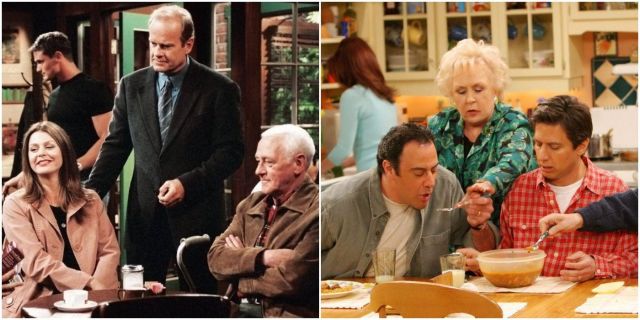TV Sitcoms provide audiences with lighthearted entertainment, delivering a ton of laughs with each episode. With the rise of streaming platforms, fans can now binge-watch entire seasons, rather than wait a whole week for the next episode to release. The comfort of sitcoms comes not only from their carefree tone, but also how they mirror the daily lives of ordinary people.
While the genre appears to have perfected the formula, sitcoms depend heavily on various tropes, many of which are patently illogical. Although several of them are overlooked by most viewers, there are a few particularly absurd concepts that still remain a part of television comedy. That said, these clichéd ingredients are simultaneously integral to a sitcom’s overall success.
Updated on November 14th, 2022 by Ajay Aravind: Sitcoms have been around since the fifties and they’re not going anywhere. The genre exploded during the 1990s and 2000s, with popular programs like Friends, Seinfeld, The Office, and Modern Family. These shows helped change the landscape of 21st-century television, creating the framework for the modern sitcom. However, even the best sitcoms contain some of the dullest narrative tropes ever crafted.
10/10 The Birth Of A Newborn Is Celebrated, But The Actual Child Is Inconsequential

Children in sitcoms are commonly used as props for the main characters. Having kids is usually vital for the plot, but the child is seldom seen or discussed after their celebrated birth episode. This phenomenon can be seen in hit series like Frasier and Friends.
Alice, Roz Doyle’s daughter, is almost never present in Frasier, despite Roz’s pregnancy being a critical element of her storyline. Rachel Green and Ross Geller’s daughter Emma disappears from Friends after a few episodes pertaining to her birth. Similarly, Ben Geller-Willick mysteriously vanishes after Friends Season 8.
9/10 Characters Are Well-Dressed And Flawlessly Manicured At All Times

Sitcom characters, including those who are stereotypically messy and sloppy, are always ready for guests to drop by. Even when lounging at home, they are seen in full outerwear — replete with designer shoes and glittering accessories. More importantly, they don’t have a single hair out of place after they just wake up. Lipstick doesn’t rub off with a kiss and mascara doesn’t get smudged unless they’re bawling their eyes out.
Victoria, Joy, and Melanie wear business casual attire in Hot in Cleveland, sporting perfectly ironed dresses, button-ups, and pleated skirts. The male characters in How I Met Your Mother and Friends, specifically Barney Stinson and Ross Geller, can usually be found in three-piece suits. On the flip side, Frasier and Niles Crane’s fancy Armani suits are an inexorable part of their snobbish attitudes.
8/10 One Character Is Always Bullied Without Any Real Reason

The irony of Friends is that none of the characters behave like true friends. Chandler, Joey, Monica, Rachel, and even Phoebe frequently bully Ross for his nerdy hobbies and checkered romantic past. In fact, it can be argued that mocking Ross’ failed marriage to Susan is an example of homophobic microaggression.
One sitcom character tends to be singled out and bullied, like Garry Gergich in Parks and Rec, Jonah Ryan in Veep, Lutz in 30 Rock, and Britta Perry in Community. While these characters are unquestionably irritating, it doesn’t mean they should be exposed to psychological abuse in the name of comedy.
7/10 Minority Characters Are Mocked And Turned Into Punchlines

Individuals belonging to minority groups not only suffer from a lack of representation, but also face the most bigotry when their characters are actually incorporated. Cis-gendered, straight, and white people get away with anything, but anyone who doesn’t align with the hetero-patriarchal norms of society turns into punchlines.
In That ’70s Show, Fez’s accent and hobbies are mocked by his friends, who blatantly refuse to learn his real name because it’s apparently too difficult to pronounce. Although this nauseating trope is finally being eradicated from sitcoms, the genre has a long way to go before it can make up for all the damage it has caused in the past.
6/10 Characters Barely Go To Work And Still Complain About Long Hours

Unless the sitcom takes place in the workplace or an educational setting, its characters barely spend time at their jobs or at school. It doesn’t matter if they have time-consuming careers; they still manage to spend most of their time at their home or at their designated hangout.
These characters then complain about working long hours, which simply doesn’t make any sense. In some cases, audiences don’t even know what their favorite characters do, like Rebecca Howe in Cheers and Ianto Jones in Torchwood. This trope isn’t entirely useless, however, as it excises the superfluous sections of a character’s life.
5/10 The Mom Is Overbearing And Uptight, While The Dad Is A Lovable Goof

All narratives depend on formulaic storytelling. In fact, researchers have claimed that every single story in the world has one of six basic plots. Sitcoms naturally follow this principle, but occasionally fail to provide enough variety when it comes to character development. Sitcom moms are consistently strict and overbearing, whereas sitcom dads are endearingly goofy.
Claire & Phil Dunphy in Modern Family, Debra & Ray Barone in Everybody Loves Raymond, Marge & Homer Simpson in The Simpsons, Lois & Hal Wilkerson in Malcolm in the Middle — the list is endless. Real-life people have different approaches to marriage and parenting, so it’s curious that their sitcom counterparts are sculpted from the same hackneyed mold.
4/10 No One Locks Their Doors, Even City-Dwellers

There was a time when people could leave their doors unlocked all day without any consequences. However, these people lived in small towns where everybody knew everybody. Those who inhabit big cities and towns are smart enough to keep their doors locked and deadbolted at all times.
Sitcom characters leave their front doors unlocked to give their friends and neighbors easy access, but most viewers consider this behavior to be unsound and incautious. In Seinfeld, Kramer constantly slides into Jerry’s apartment whenever he feels like it, even after the place is burgled. There may not be thieves and murderers lurking around every corner, but nobody takes that risk except people in sitcoms.
3/10 No One Eats Or Drinks Enough To Survive

Sitcoms often display delectable spreads and buffets, but their characters take only small bites and sips. Although this trope doesn’t reflect reality, there is a good reason why TV folk refuse to devour their food. Edible items on television are almost always props — shoots can go on for hours and TV studios get hot, so using actual food isn’t a sanitary option.
That said, viewers lose their suspension of disbelief when watching characters pick at their elaborate dishes. Meals aren’t meant to be nibbled; they’re supposed to be enjoyed. Forget eight glasses of water a day, sitcom characters rarely drink more than a spoonful.
2/10 Close Companions Remain The Same But Acquaintances Keep Changing

Countless sitcoms revolve around close-knit friend groups, including Cheers, Community, The Big Bang Theory, New Girl, among others. This is an extremely popular trope, explaining why it appears across a broad sitcom spectrum. That said, fans are naturally confused when the main gang’s acquaintances are played by one-time extras.
These negligible characters materialize very infrequently, usually during a momentous occasion like a major character’s wedding, baby shower, or birthday party. These minor acquaintance circles are regularly rotated — the same actors seldom appear multiple times. How I Met Your Mother is a particularly prominent illustration of this cliché.
1/10 Sitcom Characters Can Somehow Afford Posh Houses In Expensive Locations

Sitcom characters are sometimes wealthy, but the vast majority of them are barely scraping by when it comes to their finances. Monica Geller is an overworked chef in Friends, but she can somehow afford her apartment in Manhattan. In reality, the rent alone would wipe out all her savings and leave her with crushing debt.
However, her rent could also be cheaper since she’s technically subletting it from her grandmother. Likewise, Danny Tanner’s spacious San Francisco townhouse in Full House should have set him back a pretty penny, especially on a sportscaster’s salary. Another notable example is the apartment shared by Community’s Annie, Abed, and Troy, none of whom have jobs.















Leave a Reply